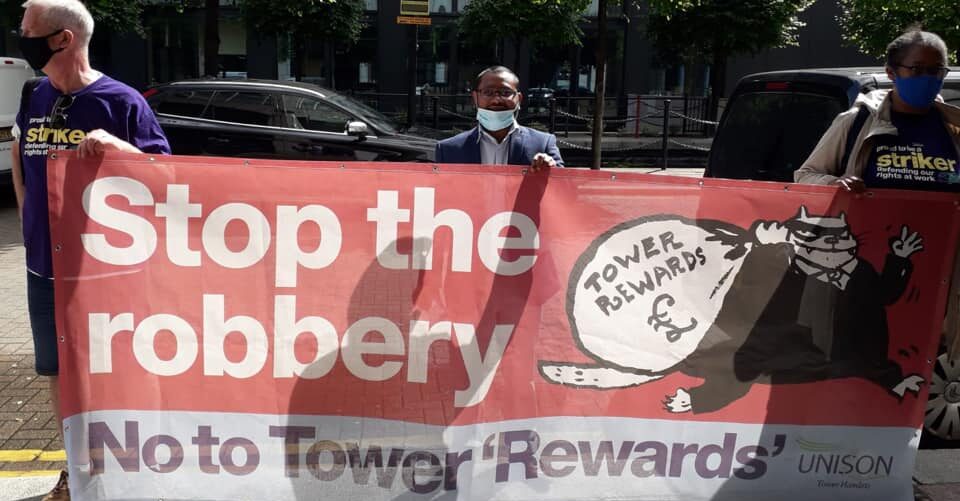

The class struggle in East London surged into life in early July as the Unison branch at Tower Hamlets Council organised a solid three day strike against the unilateral mass sacking of the entire work force.
Senior management in the Labour-run council are trying to force all the workers onto worse terms and conditions – and for some lower pay – as part of the misnamed Tower Rewards scheme. After trade unions rejected the proposals last year, management pulled the plug on consultation and pushed the nuclear button.
Whilst this ‘sack and re-engage’ tactic is increasingly popular in the private sector – both Asda and British Airways have used it to cut costs and override their unions – many are shocked to see it used by the Labour Party.
The events in Tower Hamlets are only the logical conclusion of Labour’s track record in local government in recent years. Since 2010, austerity has hit local government particularly hard; most councils have lost over 50 per cent of their funding, one council has gone bankrupt and several others claim they might follow soon.
But Labour councillors have put up no effective opposition and implacably implemented cuts, often leading to clashes with their workforces and the local community. The decision, at the height of Jeremy Corbyn’s leadership to make it an expellable offence for a councillor not to vote in favour of any Labour budget gives some idea of the prevailing attitude amongst these people.
At Tower Hamlets the picket lines were solid across seven different sites. On the Friday 3rd July, the refuse workers, organised by Unite, refused to cross the picket line which led to the council management calling the police, accusing Unison of secondary picketing.
The bin workers had themselves just come off an eight day strike over unpaid holiday arrears owed to them. On the Monday the police again harassed a picket line, arresting two people on spurious grounds. Thatcher would no doubt be proud of what the Labour council is doing.
On the Friday, the Unison branch and local anticuts groups organised an online rally with over 450 people attending. Unison general secretary Dave Prentis spoke saying that Unison wouldn’t pull its punches just because this was a Labour Council.
It is galling for the unions affiliated to Labour to be paying money to a party that then turns around and treats their members like this – but that is the reality of Labourism. Labour isn’t a class struggle party, it is an electoral party to manage capitalism. Local government is an arm of the capitalist state charged with running local services and amenities to maintain the population so they can be effectively exploited by the capitalist class.
Of course, it is better to have a Labour council which can be subjected to influence by members and trade unionists, compared to a Conservative one, but a Labour run council will ultimately make similar choices to a Tory one given the same economic pressures.
The last time there was any serious opposition from Labour in local government was in the 1980s and that period is derided as ‘loony left’ and ‘gesture politics’ – for Labour councillors today the serious business of politics is passing on cuts and facing down the unions and community campaigners if they have to. Some of them doing it reluctantly, others relish it.
Tower Hamlets management are now pressuring staff to sign the new contracts, any that don’t will be out of a job. Unison has threatened more days of strike action on 14-16 July.
Workers are particularly furious that they are being treated like this in the middle of a pandemic where front line council staff have been risking their lives to assist with public health and keeping vital services functioning. One said of the council management, ‘First they clap us, then they slap us.’
The only response to this assault is to build the strike, using effective action including secondary picketing to draw out more sections of workers, and organizing a strike committee of elected delegates from the workforce to oversee negotiations and determine the conduct of the strike.
The use of the police to intimidate strikers shows the need for the trade unions to organize picket-line defence groups to protect striking workers.
Labour Party members should organize a mass solidarity demonstration and help beat back this attack which will only accelerate the destruction of local services and weaken the working class resistance to the developing economic crisis.